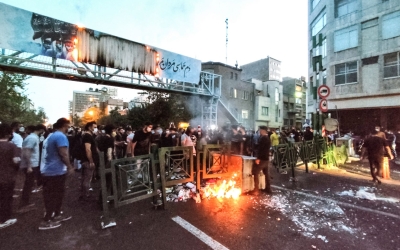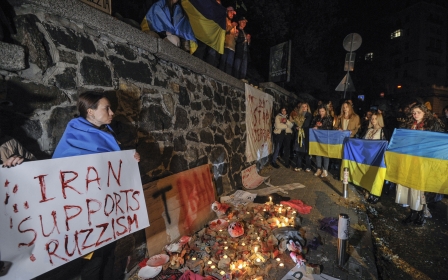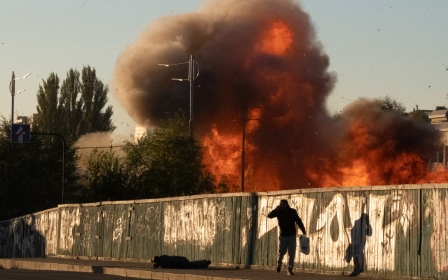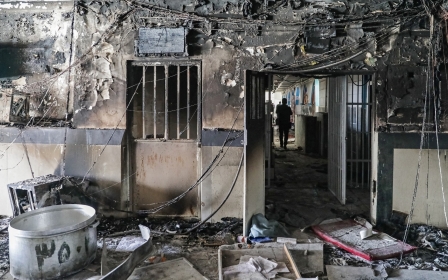Iranian start-ups and businesses face disaster over internet shutdown

For more than a month Iranians have faced unprecedented restrictions on their internet access, as the government attempts to tackle the ongoing wave of protests over the death of Mahsa Amini.
Increasingly, the restrictions are beginning to have an impact on Iran's already struggling economy, with many businesses across the country heavily reliant on the internet for promotion and sales
Currently, all social networks including Instagram, WhatsApp and many other applications such as Google Play, as well as a lot of online games, are blocked.
'The livelihood of about nine million people who sell their products online is in danger'
- Hossein Salahvarzi, Iran Chamber of Commerce
The government has also imposed restrictions on access to foreign websites at various times, forcing Iranians to rely on the so-called "national internet" that allows only local sites.
Speaking to Middle East Eye on condition of anonymity, an Iranian merchant and start-up owner said the situation was creating an "unpredictable" environment for many new businesses.
New MEE newsletter: Jerusalem Dispatch
Sign up to get the latest insights and analysis on Israel-Palestine, alongside Turkey Unpacked and other MEE newsletters
"Many of our knowledge-based businesses were in the stages of attracting investments. In this year, they hoped for growth, but unfortunately they have so far suffered huge credit losses from these events," he explained.
“We have dozens of Iranian companies in Iraq, Turkey and Afghanistan that tried hard to attract customers from the region in the days after Covid-19 and now they are losing reputation due to the interruption of the internet."
In addition to the other restrictions, the government has spent time attacking and dismantling VPNs - virtual private networks - in order to prevent access to foreign websites.
While many have been able to circumvent this, they are left browsing at an excruciatingly slow speed, while local websites then become inaccessible.
This has all left many businesses deeply concerned as, according to Reza Olfat-Nasab of the board of directors of the Online Business Union, the number of online shops in Iran reached 300,000 last year, while the incomes of 10 million Iranians are reportedly dependent on Instagram - which is now blocked in Iran.
Hossein Salahvarzi, vice president of the Iran Chamber of Commerce, has stated that every hour of internet shutdown results in damage to the economy worth $1.5m.
“The livelihood of about nine million people who sell their products online is in danger and the continuation of this situation will increase the migration of genius people and startups and decrease investment," he said.
Livelihoods in danger
According to research carried out by the Tehran Computer Trade Union Organization, in the past few weeks, 47 percent of internet businesses have lost more than 50 percent of their income.
Based on these statistics, the organisation has estimated that if the internet disruptions continue, 73 percent of businesses with less than 50 employees will lose 50 million tomans (around $1,180) a day.
Based on a report released by Zarin Pal, a company active in the field of online transactions, in the first five days of the internet disruptions in Iran, transactions in the clothing business category have decreased by 71 percent, the social network category by 60 percent, and the educational category by 56 percent in volume and number.
Music site BeepTunes said sales had decreased by 45 percent, while Padroshop, which provides an online sales infrastructure for social network retailers, said the total sales of its top 10 partners and stores on Instagram have faced an 87 percent decline.
In addition, about 12 million Iranians are directly and indirectly active in the cryptocurrency market, and have suffered losses as cryptocurrency exchange applications face restriction.
"You can say to the customer that due to an internet disruption, our service is not available for one or two days, but when the internet shutdown continues for more than a month, you can no longer say that it was just a simple disruption," said the start-up owner.
"Our regional partners are extremely dissatisfied with Iran's digital economy companies.”
Migration
Despite these reports, Iranian lawmakers have stated there would be no return to normal service unless there is an end to the protests.
'Besides the internet restrictions and our huge financial loss, our most important challenge now is that our employees are already migrating one by one'
- Ad company owner
So far, human rights groups suggest more than 200 people have died during the crackdown on the demonstrations, which were sparked off by the death of 22-year-old Kurdish Iranian woman Mahsa Amini after being detained in police custody over her headscarf.
The outpouring of anger has shaken the Islamic Republic, while foreign governments have responded by imposing sanctions on top of those already imposed on the country.
The fear among many is that young people, who make up the majority of the Iranian population, will increasingly feel they have no future in the country.
A co-founder of an online ad company told MEE that this was already hitting IT and software developers in Iran.
“Besides the internet restrictions and our huge financial loss, our most important challenge now is that our employees are already migrating one by one," he said.
Middle East Eye delivers independent and unrivalled coverage and analysis of the Middle East, North Africa and beyond. To learn more about republishing this content and the associated fees, please fill out this form. More about MEE can be found here.





